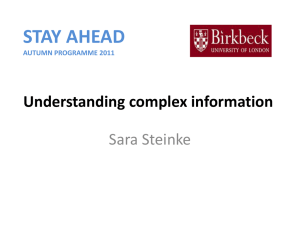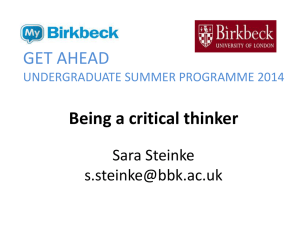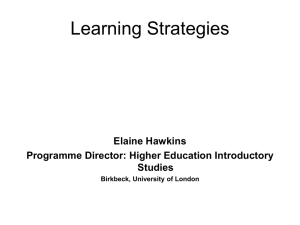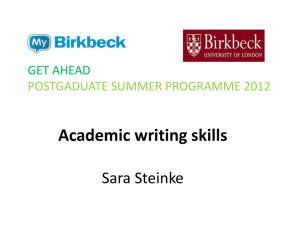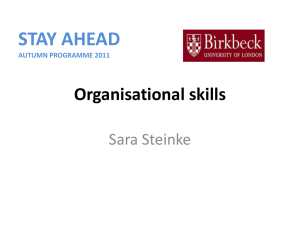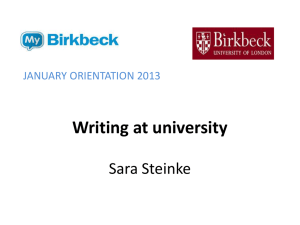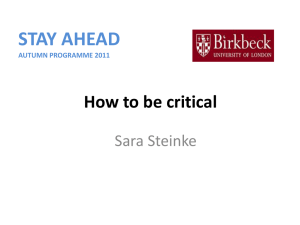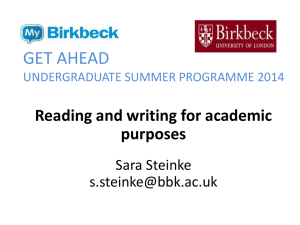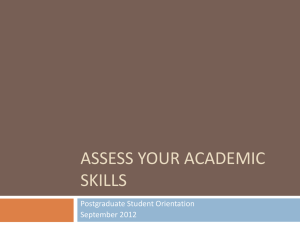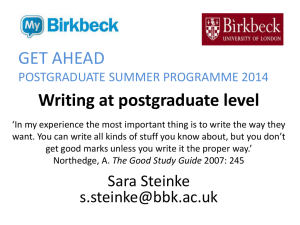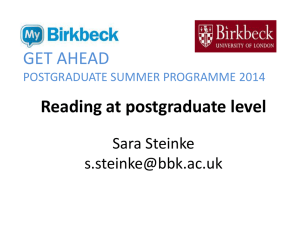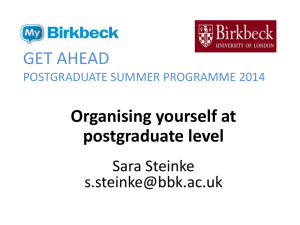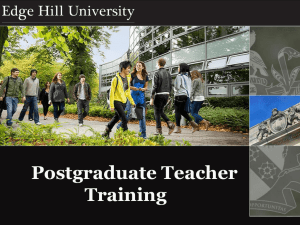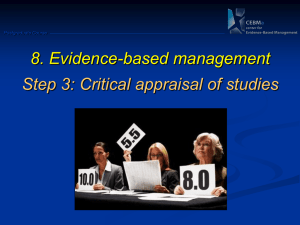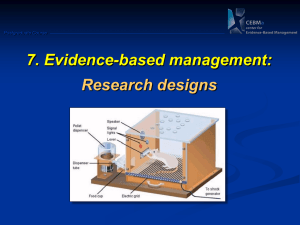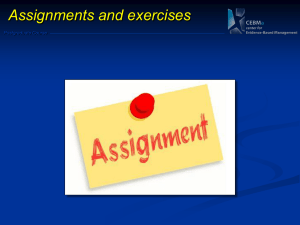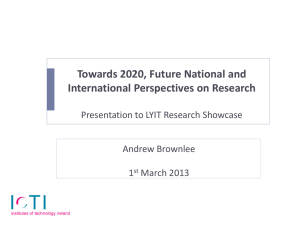Critical thinking at postgraduate level
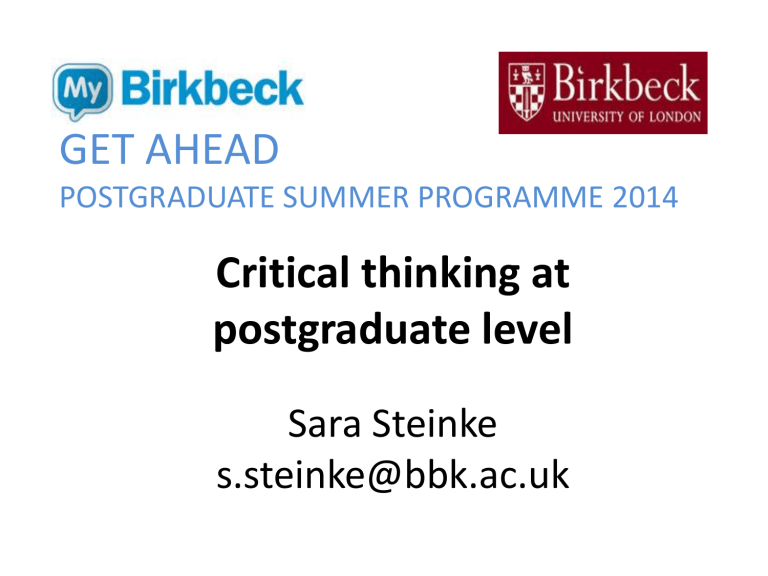
GET AHEAD
POSTGRADUATE SUMMER PROGRAMME 2014
Critical thinking at postgraduate level
Sara Steinke s.steinke@bbk.ac.uk
Aims of the session
• To review what is meant by critical thinking
• To identify the importance of advanced critical thinking - higher order thinking - for postgraduate study
• To reflect on how to develop your critical thinking in preparation for postgraduate study
• To introduce the link between higher order thinking and advanced critical reading and writing at postgraduate level
Think about the following
Critical thinkers can
...
1. Summarise complex ideas
2. Evaluate arguments and evidence
3. Understand opposing positions
4. Draw reasonable conclusions
5. Predict logical consequences
6. Devise sensible alternatives
7. Solve complex problems
8. See connections between subjects
9. Distinguish between emotive and neutral vocabulary
10. Distinguish between theory, fact, opinion
Anderson’s and Krathwohl’s Taxonomy of Cognitive Domain
1.
Remembering: Retrieving, recalling, or recognising knowledge from memory.
2.
Understanding: Constructing meaning from different types of functions be they written or graphic messages activities like interpreting, exemplifying, classifying, summarising, inferring, comparing, and explaining.
3.
Applying: Carrying out or using a procedure through executing, or implementing.
4.
Analysing: Breaking material or concepts into parts, determining how the parts relate or interrelate to one another or to an overall structure or purpose.
5.
Evaluating: Making judgments based on criteria and standards through checking and critiquing.
6.
Creating: Putting elements together to form a coherent or functional whole; reorganising elements into a new pattern or structure through generating, planning or producing.
Importance of critical thinking at university (1)
1. Occurs across all teaching/learning activities cornerstone of academic study
2. Involves thinking analytically about yours and other peoples work/ideas - adopting a critical distance
3. Examines the messy grey area, rather than supplying black or white, yes or no answers means of pushing the boundaries of knowledge forward
Importance of critical thinking at university (2)
4.Not simply related to content - involves the means of producing knowledge
5.Involves a variety of academic skills
reading, note-making, essay/report writing, revision strategy, exam technique, presentations, organisational skills, time management
6.Requires an active, independent, reflective approach to learning - C.R.E.A.M. approach to learning
Cottrell, S. The Study Skills Handbook
C - Creative have the confidence to use your individual strategies and styles, apply imagination to your learning
R - Reflective sit with your experience, analyse and evaluate your own performance and draw lessons from it
E - Effective organise your space, time, priorities, state of mind and resources to the maximum benefit
A - Active be personally involved, do things, physically and mentally in order to make sense of what you learn
M - Motivated be aware of your desired outcomes using short and long-term 'goals'
Importance of advanced critical thinking for postgraduate study
• Greater engagement with methodology
• Required to write a literature review
• Better understanding of how to project manage/problem solve in the research process including producing primary research
• Reflected in the structure of a dissertation
• What employers expect of you
• Related to improved motivation, time management - and battle against procrastination, isolation
What is critical thinking? (1)
Cottrell, S. The Study Skills Handbook
1. Stand back from the information given
2. Examine it in detail from many angles
3. Check whether it is accurate
4. Check each statement follows logically
5. Look for possible flaws in the reasoning/ evidence/conclusion
6. Compare the same issue from point of view of theorists/writers
What is critical thinking? (2)
7.
Explain why different people arrive at different conclusions
8.
Argue why one opinion/result/conclusion is preferable to another
9.
Be on guard for devices that encourage the reader to take questionable statements at face value
10. Check for hidden assumptions
11. Check for attempts to lure the reader into agreement
Think about the following
1. What is the main
argument of the article? You have been asked to read an article in preparation for a lecture.
2. What are the reasons given to justify the argument?
3. What evidence has been used?
What questions might you ask in order to think critically about the article?
4. What do you know about the author?
5. What audience is the author addressing?
6. What sources has the author used?
Critical thinking
Can you:
distinguish between fact and opinion?
draw conclusions based on evidence?
account for different points of view and detect bias?
see the wider picture?
do you know the difference between description, analysis and evaluation?
Importance of advanced critical thinking skills for the research process
What is the importance of advanced critical thinking for the research process at postgraduate level?
1. Preparing for your viva
2. Presentation skills - conference/teaching
3. Writing/structuring your thesis
4. Time management/dealing with procrastination and isolation
5. Research ethics
6. Knowledge management
7. Project planning/problem solving
8. Managing discussion
9. Writing for different audiences
10. Creative thinking
11. Managing your supervisor
Importance of critical reading
more at session on 19 August
Can you:
select and use different reading strategies (e.g. skim, scan, in-depth)?
think about what you need to find out before you start reading (are you reading to verify facts, to understand a subject in general or to analyse a particular argument)?
critically evaluate reading?
deal with new vocabulary?
Importance of critical writing
more at session of 27 August
Can you:
express your ideas clearly in written form?
make an outline of what you are going to write?
write in clear sentences and paragraphs?
link your ideas in a logical order?
use correct grammar?
develop your own argument?
identify your audience and write in an appropriate register?
Useful books
Becker, L. (2004) How to Manage your
Postgraduate Course (Palgrave)
Cottrell, S. (2005) Critical Thinking Skills (London,
Palgrave)
Cottrell, S. (2005) Critical Thinking Skills (London,
Palgrave)
Wisker, G. (2008) The Postgraduate Research
Handbook, 2 nd ed. (Palgrave)
Wallace, M. & Wray, A. (2011) Critical Reading and
Writing for Postgraduates, 2 nd ed. (Sage)
Useful websites
http://www.palgrave.com/skills4study/mp3s.asp#Critical
12 minute audio file based on Cottrell’s Critical Thinking Skills http://www.palgrave.com/skills4study/studyskills/thinking/index
.asp
helpful information on critical thinking skills on the Skills4Study
Website http://www.bbk.ac.uk/mybirkbeck/get-ahead-stay ahead/skills/critical-thinking
5 minute interactive tutorials supporting this Student
Orientation programme http://www.bbk.ac.uk/mybirkbeck/studyskills/course_timetable academic skills workshops dealing with critical thinking skills – and other academic skills - in greater detail
More useful websites
http://www.palgrave.com/skills4study/studentlife/postgraduate/ index.asp
http://www.bbk.ac.uk/mybirkbeck/services/facilities/support/ph d-support http://www.bbk.ac.uk/mybirkbeck/services/facilities/support/ research-ethics http://www.bbk.ac.uk/mybirkbeck/services/facilities/support/ research-projects http://www.bbk.ac.uk/mybirkbeck/services/facilities/support/ research-skills http://www.bbk.ac.uk/mybirkbeck/services/facilities/support/ internet
Recap of the session
• Have you understood the importance of advanced critical thinking - higher order thinking - for postgraduate study?
• How are you going to develop your critical thinking for postgraduate study?
• Have you thought about the importance of advanced critical thinking for the research process at postgraduate level?
• Are you aware of the link between higher order thinking and advanced reading and writing at postgraduate level?
Next session
• Tuesday 19 August, 6pm-7.30pm, room 421
• Reading at postgraduate level
coping with large amounts of reading
increasing your understanding of the reading
reading strategies for academic purposes, including more complex reading
note-making for academic purposes
